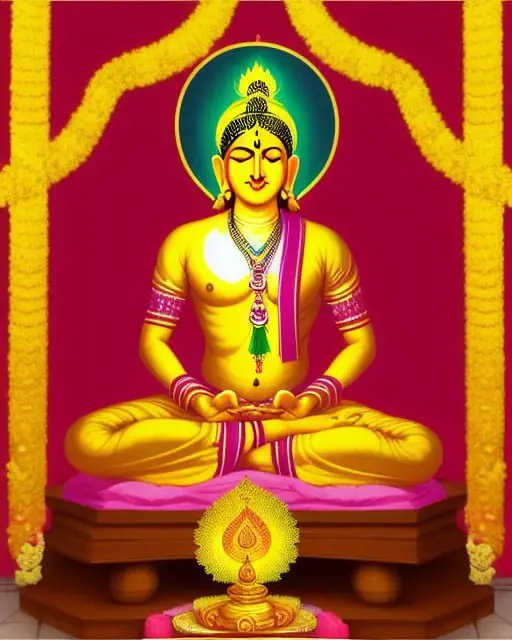Nirvana Shatkam & Sanskrit Poetry
Indian literature is a vast ocean of knowledge and wisdom, providing insights into various aspects of life. Among the many gems of Indian literature is Nirvana Shatkam, which offers profound lessons that can guide us toward a fulfilling life. These ancient texts hold valuable insights that are still relevant in today’s world.
Exploring the Beauty of Nirvana Shatkam & Sanskrit Poetry
Nirvana Shatkam, also known as Atma Shatkam, is a powerful poem written by Adi Shankaracharya, a great philosopher, and saint of ancient India. The poem consists of six verses that describe the nature of the Self or Atma. The beauty of Nirvana Shatkam lies in its simplicity, as it uses easy-to-understand language to convey complex philosophical concepts.
Sanskrit poetry, on the other hand, is a vast collection of literature that spans over thousands of years. It includes works of great poets like Kalidasa, Valmiki, and Tulsidas, among others. The beauty of Sanskrit poetry lies in its vivid imagery, metaphors, and the use of language that allows for multiple interpretations.
Life Lessons to Learn from Ancient Indian Literature
Nirvana Shatkam and Sanskrit poetry offer valuable life lessons that can help us navigate through the complexities of life. These teachings are relevant even today, and can help us live a more fulfilling life.
One of the key life lessons from Nirvana Shatkam is the importance of realizing our true nature, which is pure consciousness or Atma. It teaches us to go beyond our ego and identify with the eternal, unchanging essence within us. This realization can help us overcome our fears, anxieties, and other negative emotions, leading to a more peaceful and contented life.
Sanskrit poetry, on the other hand, offers lessons on various aspects of life, including love, friendship, nature, and spirituality. For example, the famous poem ‘Meghdoot’ by Kalidasa teaches us about the power of love, and how it can transcend physical barriers. Similarly, the Ramayana by Valmiki teaches us about the importance of duty, sacrifice, and the power of righteousness.
In conclusion, Nirvana Shatkam and Sanskrit poetry are a treasure trove of wisdom and knowledge, offering valuable life lessons that can guide us toward a fulfilling and meaningful life. These ancient texts offer insights into various aspects of life, including spirituality, love, and duty, among others. By exploring the beauty of Sanskrit literature, we can learn from the experiences of our ancestors and apply their teachings in our everyday lives.
Lyrics translated in English and if you want to listen please click “Atma Shatkam“
Credit to Wikipedia
I am not mind, nor intellect, nor ego, nor the reflections of inner self (citta).
I am not the five senses.
I am beyond that.
I am not the seven elements or the five sheaths (pañca-kośa).
I am indeed, That eternal knowing and bliss, the auspicious (Śivam), pure consciousness.
Neither can I be termed as energy (prāṇa),
nor five types of breath (vāyus – Prāṇa, Apāna, Vyāna, Udāna, Samāna),
nor the seven material essences,
nor the five sheaths (pañca-kośa).
Neither am I the organ of Speech, nor the organs for Holding ( Hand ), Movement ( Feet ) or Excretion.
I am indeed, That eternal knowing and bliss, the auspicious (Śivam), pure consciousness.
I have no hatred or dislike,
nor affiliation or liking,
nor greed,
nor delusion,
nor pride or haughtiness,
nor feelings of envy or jealousy.
I have no duty (dharma),
nor any purpose (artha),
nor any desire (kāma),
nor even liberation (mokṣa).
I am indeed, That eternal knowing and bliss, the auspicious (Śivam), pure consciousness.
I have neither merit (virtue),
nor demerit (vice).
I do not commit sins or good deeds,
nor have happiness or sorrow,
pain or pleasure.
I do not need mantras, holy places, scriptures (Vedas), rituals or sacrifices (yajñas).
I am none of the triad of the observer or one who experiences, the process of observing or experiencing, or any object being observed or experienced.
I am indeed, That eternal knowing and bliss, the auspicious (Śivam), pure consciousness.
I do not have fear of death, as I do not have death.
I have no separation from my true self, no doubt about my existence,
nor have I discrimination on the basis of caste or creed.
I have no father or mother,
nor did I have a birth.
I am not the relative,
nor the friend,
nor the guru,
nor the disciple.
I am indeed, That eternal knowing and bliss, the auspicious (Śivam), pure consciousness.
I am all pervasive.
I am without any attributes, and without any form.
I have neither attachment to the world,
nor to liberation (mukti).
I have no wishes for anything
because I am everything,
everywhere,
every time,
always in equilibrium.
I am indeed, That eternal knowing and bliss, the auspicious (Śivam), pure consciousness

